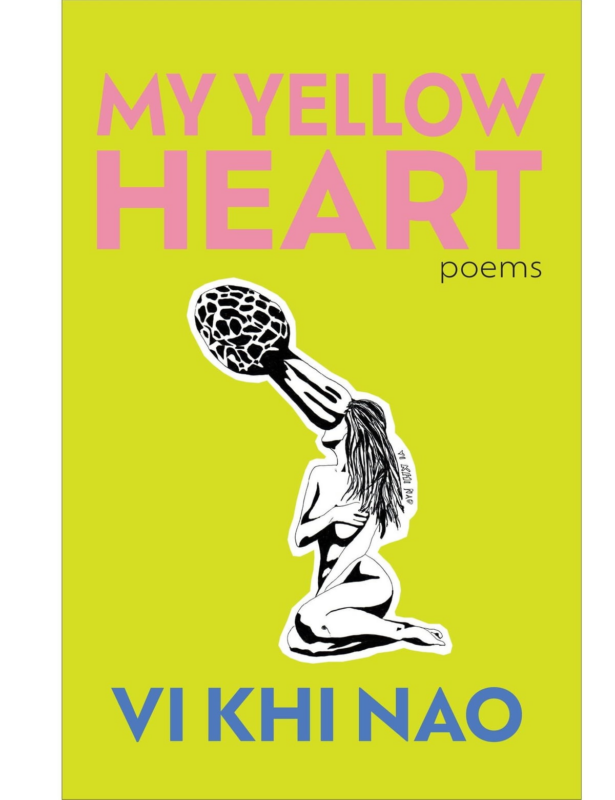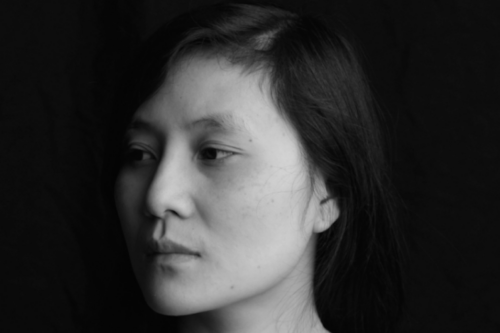
Zuihitsu, “lists built to cause surprise through a mix of surprise and variety,” are the cornerstone of Vi Khi Nao’s latest poetry collection My Yellow Heart. Prefaced by a copy of a blast email sent towards the end of March 2022, the collection is framed as an elongated response to a prompt. The email’s sender is Erik Ehn, who asks the recipients to practice in zuihitsu, “compassionate noting” for two weeks following the theme of “changed-for-changing.” The poetry collection follows suit, immediately creating a narrative through numbered lists, with the first half of poems titled with dates, as if in response to the prompt.
The first poem, “SATURDAY: APRIL 30, 2022: 10AM,” introduces the motifs and topics that will be explored throughout the collection. The first notation is “No one uses duct tape as well as my brother.” These simple observations, especially centering her brother, are a great insight into what the rest of the collection will hold; the use of everyday happenstance as a means to explore the gravity of relationships, like that of her brother.
Nao’s brother is an Uber driver, and the various “changes” listed in the poems hint at his suffering from some kind of illness; whether it is mental or physical– or both– is unclear. Throughout the collection, the narrative of Nao’s internal struggle in loving and aiding him through his health journey is depicted in these lists. She writes that she Venmos him money for Uber rides when he won’t accept her payment on the app, that she provides him a place to sleep, that she makes sure he’s eating. Nao grapples with a dual understanding of love, wherein she wishes to be the support that may bring him out of his illness, but does not wish to be overbearing. Her notation of “change” comes out in a unique way, as in “FRIDAY MAY 6, 2022”: “22. I want to air his sheets. / 23. I want him to know that I care about him. / 24. Shall I invade his privacy by cleaning his room for him?” Acts of service are displayed as a form of love, and Nao struggles with the wish to do more or say more, but resigns herself to her small acts of aid and her lists.
As the narrative of the brother’s health and Nao’s reaction to it develops, there is a return to this element of surprise in the zuihitsu, blending with the emphasis on change. Nao reflects in “MONDAY MAY 9 2022,” “8. Having known him for over 40 years, his taste and preferences still surprise me. / 9. Continue to surprise me.” Here, Nao shifts away from each element of the lists as a new thought or change notated. Instead, she begins to simply treat each list element as a line break, emphasizing the importance of each phrase much more than a line break on its own would. By repeating her surprise here, she is calling attention to the prompt and the impact of change that surprise can bring.

The latter half of the collection moves away from the chronologically-named poetry and shifts towards poems titled with long, sentence and sometimes paragraph-like phrases for titles. These poems move away from the topic of the brother and from the poem as a narrative story-telling device, into Nao’s usual style of messages hidden under often cryptic poetry.
One poem is titled as a long, run-on sentence: “THE ECONOMY OF YOUR DESIRE HAS ENTERED THE ICE AGE OVERNIGHT, FROZEN LAKES OF DESPAIR, IT WILL TAKE FOREVER TO THAW OUT YOUR HAIR, EXOGENOUS ZONES, THE EVERGLADES OF YOUR TONGUE & FINGER MORTGAGES, THE UNEMPLOYMENT BENEFITS OF OUR KISSES HAVE PLUNGED INTO 26 MILLION, THERE ARE BILLIONS OF STIMULATION, BUT NONE COULD GET THE DICK HARD, ENOUGH TO KICK THE DEPRESSION AWAY.”
As in her 2022 collection Fish Carcass, the latter half of My Yellow Heart turns to the topics of sex and sexuality. In past works, Nao’s exploration of these topics have been clear-cut; the poem’s speaker made their message clear. My Yellow Heart, because of the list format, introduces a new style of exploration for Nao. Nao writes “9. It’s a good time to reopen the masturbation / 10. Of defeatism and melancholy.” Using sexuality as a metaphorical exploration of psyche, Nao calls upon the concept of zuihitsu once more, bringing in an air of surprise in her juxtaposition of something sensual with something negative. And yet, masturbation carries a dirty and shameful connotation, allowing this rhetorical playfulness to slip a sense of understanding into the reader. Through enjambment, masturbation is afforded some distance from defeatism and melancholy. There is a lack of a speaker-topic relationship in these lines; rather, the poetry reads more like the transcription of one’s stream-of-consciousness. Unlike her previous poetry, Nao lets the abstract nature of this collection run wild, merely hinting at feeling and meaning. She continues to tackle topics that are familiar to her readers, but approaches them in a new, often refreshingly abstract way.
Nao’s poetry generally tackles difficult themes with a graceful mastery of words and style. My Yellow Heart is no different. She imbues the collection with a compelling narrative, one simultaneously universal and specific to her family and her life. The list-style brings structure to the otherwise cryptic method of storytelling that Nao often exhibits in her poetry. My Yellow Heart is a beautifully dark collection that encapsulates the poetry of Vi Khi Nao in an invigoratingly uncommon style.
My Yellow Heart
by Vi Khi Nao
Girl Noise Press, $14.00

Melina Kritikopoulos is a mixed-race writer and journalist of Greek and Vietnamese descent. She is an undergraduate student at the University of California, Berkeley where she works for The Daily Californian. She produces and hosts the podcast Poetic Pontification, highlighting poets of the East Bay Area.


